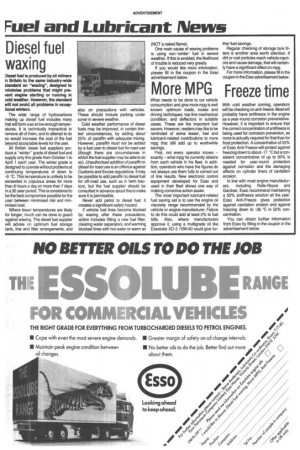Diesel fuel waxing
Page 43

If you've noticed an error in this article please click here to report it so we can fix it.
Diesel fuel is produced by all refiners In Britain to the same Industry-wide standard on "wasting", designed to minimise problems that might prevent engine starting or running in cold weather. However, the standard NM not avoid all problems in exceptional winters.
The wide range of hydrocarbons making up diesel fuel includes many that will form wax at low enough temperatures. It is technically impractical to remove all of them, and to attempt to do so would increase the cost of the fuel beyond acceptable levels for the user.
All British diesel fuel suppliers produce a "winter" grade of diesel fuel and supply only this grade from October Ito April 1 each year. The winter grade is designed to operate without problems at continuing temperatures of down to -9 °C. This temperature is unlikely to be exceeded in populous areas for more than 8 hours a day on more than 7 days in a 30 year period. This is considered to be the best compromise possible for the user between minimised risk and minimised cost.
Where lower temperatures are likely for longer, much can be done to guard against waxing. The diesel fuel supplier will advise on optimum fuel storage tank, line and filter arrangements, and also on precautions with vehicles. These should include parking under cover in severe weather.
Cold weather performance of diesel fuels may be improved, in certain limited circumstances, by adding about 25% of paraffin with adequate mixing. However, paraffin must not be added by a fuel user to diesel fuel for road use (though there are circumstances in which the fuel supplier may be able to do so). Unauthorised addition of paraffin to diesel for road use is an offence against Customs and Excise regulations. It may be possible to add paraffin to diesel fuel for off-road use, such as in farm tractors, but the fuel supplier should be consulted in advance about this to make sure it is permissible.
Never add petrol to diesel fuel: it creates a significant safety hazard.
If vehicle fuel lines become blocked by waxing after these precautions, action includes fitting a new fuel filter, clearing water separators, and warming blocked lines with hot water or warm air (NOT a naked flame).
One main cause of waxing problems is using non-Winter' fuel in severe weather. If this is avoided, the likelihood of trouble is reduced very greatly.
If you would like more information, please fill in the coupon in the Esso advertisement below.
More MPG
What needs to be done to cut vehicle consumption and give more mpg is well known: optimum loads, routes and driving techniques; top-line mechanical condition; and deflectors in suitable cases. These are the important fuel savers. However, readers may like to be reminded of some lesser, fuel and lubricant-related contributions to more mpg that still add up to worthwhile savings.
First, not every operator knows — exactly — what mpg he currently obtains from each vehicle in his fleet. In addition, operators who have the figures do not always use them fully to correct out of line results. New electronic control equipment developed for Esso and used in their fleet shows one way of making corrective action easier.
The most important lubricant-related fuel saving aid is to use the engine oil viscosity range recommended by the vehicle or engine manufacturer. Failure to do this could add at least 2% to fuel bills. Also, where manufacturers approve it, using a multigrade oil like Essolube XD-3 15W/40 could give fur ther fuel savings.
Regular checking of storage tank filters is another area worth attention. If dirt or rust particles reach vehicle injectors and cause damage, that will certainly have a significant effect on mpg.
For more information, please fill in the coupon in the Esso advertisement below.
Freeze time
With cold weather coming, operators will be checking on anti-freeze. Most will probably have antifreeze in the engine as a year-round corrosion preventative. However, it is important to ensure that the correct concentration of antifreeze is being used for corrosion prevention, as more is actually required for that than for frost protection. A concentration of 33% of Esso Anti-Freeze will protect against freezing down to about -17 °C but a consistent concentration of up to 50% is needed for year-round protection against corrosion and the damaging effects on cylinder liners of cavitation erosion.
In line with most engine manufacturers, including Rolls-Royce and Gardner. Esso recommend maintaining a 50% antifreeze solution all the year. Esso Anti-Freeze gives protection against cavitation erosion and against freezing down to -36 °C in 50% concentration.
You can obtain further information from Esso by filling in the coupon in the advertisement below.


















































